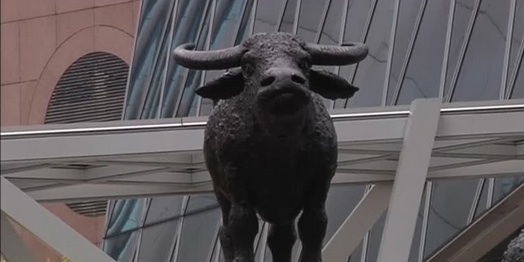
(REUTERS) Chinese stocks rebounded around 6 percent on Thursday (July 9), as Beijing’s increasingly frantic attempts to arrest a sell-off that has roiled global financial markets finally appeared to gain some traction.
China’s securities regulator took the drastic step late on Wednesday of ordering shareholders with stakes of more than 5 percent from selling shares for the next six months, in a bid to halt a plunge in stock prices.
The banking regulator said separately it would allow lenders to roll over loans backed by stocks.
One analyst said on Thursday that the supportive measures taken by Chinese authorities were not “appropriate”.
On Wednesday (July 8), Hong Kong stocks suffered their biggest one-day drop since October 2008, dragged down by another tumble on mainland exchanges, as well as bearish overseas markets amid fresh doubts that Greece can reach a bailout deal with Europe.
The Hang Seng index plunged 5.8 percent to end at 23,516.56, the lowest close since January. The China Enterprises Index lost 6.1 percent in the biggest fall since September 2011, to 11,107.30 points, the lowest close since December.
Alicia Garcia Herrero, Chief Economist for Asia Pacific at NATIXIS, said most of the Hong Kong stock market was now highly correlated to the mainland markets.
“Of course there is at the beginning what we economists call portfolio reallocation, meaning that if you were really very exposed in the mainland, and you can actually play around whatever restrictions we still have. You could say, OK, let’s hide in Hong Kong. But that’s a very short term thought because we basically have most of the Hong Kong stock market very much linked to Chinese corporate. So, frankly, I expect pretty bad news for Hong Kong soon in terms of stock market development,” she said.
The plunge in China’s previously booming stock markets, which had more than doubled in the year to mid-June, is a major headache for President Xi Jinping and China’s top leaders, who are already grappling with slowing growth.
Beijing, which had made handing a larger role to market forces a centrepiece of its economic reforms, has responded with a battery of measures to support the stock market, including an interest rate cut, suspension of initial public offerings and enlisting brokerages to buy stocks, backed by cash from the central bank.
However, Herrero believes that the measures Chinese authorities are taking were not “appropriate”.
“So there is not much to add to China’s terrible stock market development and, amazingly so, Chinese authorities’ terrible measures. So, you know, it all goes together. If they were managing to run the measures in a way that would stabilize the markets we could have had a booming situation after so many days already of terrible news. Frankly I don’t think the measures they are taking are the appropriate ones,” Herrero said.
Chinese stocks rallied on Thursday after the securities regulator banned shareholders with large stakes in listed firms from selling, in Beijing’s most drastic step yet to stem a sell-off that has roiled global financial markets.
As the daily drumbeat of official announcements aimed at propping up the sinking equity market continued, state news agency Xinhua said police would investigate “malicious” short-selling of stocks, and the banking regulator said it would allow lenders to roll over loans backed by stocks.
In what was at least a temporary reprieve, the CSI300 index of the largest listed companies in Shanghai and Shenzhen jumped 5.8 percent in morning trading, while the Shanghai Composite Index gained 5.3 percent. Both had tumbled around 6-7 percent on Wednesday.
Chinese investors had mixed feelings about China’s recent turmoil in its equity markets.
“To be honest, I think the government is laundering money from ordinary people right now. So it will depend, in the long term, if the markets will gradually rise from the current lows. I’ve recently invested in the stocks with my friends, but only for fun,” said 28-year-old investor Mi Jun.
Some people still have faith in the future of the Chinese markets.
“Overall, it’s still a bull market. It’s experiencing turmoil as some people are doing short-selling. Overall it’s bullish. I think money will come back sooner or later,” said Ms. Gao, who is accountant.
“The first thing would be where the money goes. Most of the money probably will not stay in the stock markets, instead that will be invested in some other areas to maintain the value. And I think financial crisis is still far away from us. Yes. I’m pretty optimistic,” said 23-year-old investor Wang Zijun.
More than 30 percent has been knocked off the value of Chinese shares since mid-June, and for some global investors the fear that China’s market turmoil will destabilise the financial system is now a bigger risk than the crisis in Greece.
The United States has voiced worries the stock market crash could get in the way of Beijing’s economic reform agenda.







